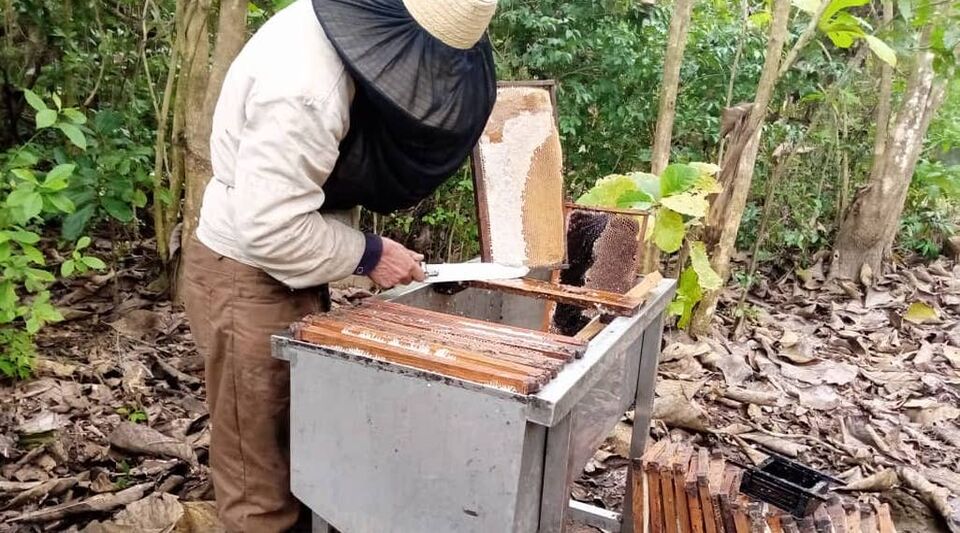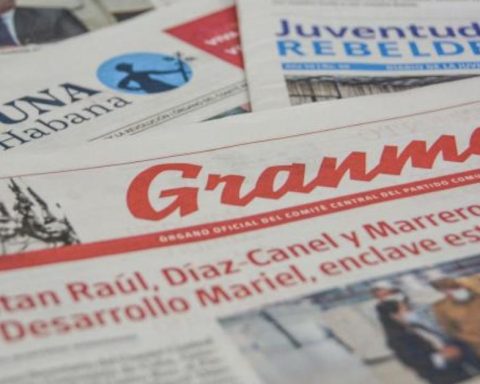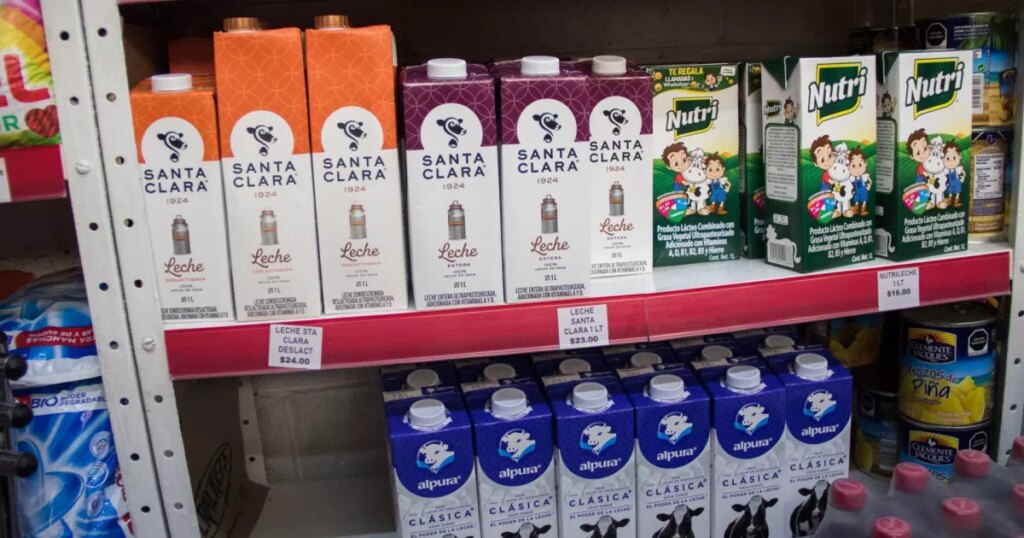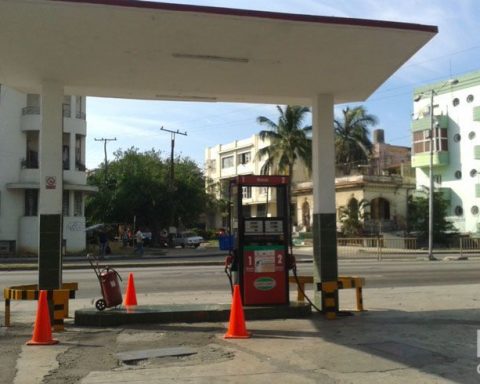Although honey is one of the great “disappeared” in the Cuban family pantry, the State knows how to sell it abroad, and at very high prices. The purity and quality of the product have given the island’s honey an international reputation and it is not uncommon to find all kinds of packaging in supermarkets in Europe and Latin America that advertise its origin as a sign of superiority.
Beekeeping escapes the usual rules of trade in Cuba. The state pays the farmer for honey at a better price than the informal market. The loyalty of the producer, yes, has to be absolute: no traps to sell to the leftNot too many liters for own consumption. Otherwise, inspectors can seize the equipment, withhold the honey, and make you pay an exorbitant fine.
“This profession does not take as much effort as dedicating yourself to agriculture,” he comments to 14ymedio Lele, a 56-year-old farmer living in Rosalía, a rural town in Camajuaní, in the province of Villa Clara. “But not everyone has the courage to face bee stings. To find an assistant I have to go through several houses looking for someone who wants to work,” he laments.
Lele began as a beekeeper to collaborate with a friend of his. Over time, he has come to own nine hives and an estimated annual production of six to seven tons of honey. Everything must be delivered to the state-owned Cuban Beekeeping Company (Apicuba), which then transfers it to the processing plant, assesses the quality and determines the price.
Almost all beekeepers turn to the State instead of looking for private buyers. “It’s more profitable,” explains Lele. “The producer earns from 35,000 to 40,000 pesos for each ton and, if in Apicuba they consider that the honey is exportable, they propose to pay an additional 600 MLC (freely convertible currency).”
The “trick” of this added payment is that the producer must pay a “counter value” for each MLC received. In other words, in order for them to deliver the currency, they have to deduct from the 35,000 pesos of their payment the equivalent of 600 MLC, that is, at a favorable exchange rate of 24 pesos, which means delivering 14,400 pesos. In short, for each ton of exportable honey he will be able to earn 20,600 pesos and 600 MLC, which Apicuba will transfer to his card.
Almost all beekeepers turn to the State instead of looking for private buyers. “It is more profitable,” explains Lele
However, the payment is frequently delayed and depends on the distribution of the lots that the State allocates for export. The farmer can deliver a certain amount of honey to Apicuba, but until it is fully sent abroad, he will not receive full payment.
“It’s been more than a month since I paid the equivalent value of the MLC to Apicuba for the honey that I delivered,” complains Yaniel, a producer from Camagüey. “I know that they already sent the export shipment in September and my money has not ‘dropped’ on my card yet. The answer they give me is that it is the bank’s fault. I’m still waiting.”
Many beekeepers also lament the bureaucracy they must overcome before receiving –sometimes five or six months late– their money. Apicuba demands to bring the identity card photocopied on both sides, a document that certifies the producer as part of a cooperative and another copy of the contract signed with the state company corresponding to the current year.

The farmer travels to his place of work in a cart pulled by oxen. He carries his instruments: a centrifuge, a bellows, a skinner and the tank to transport the honey. Protected by a suit, hat and mesh, Lele carefully extracts the squares from each hive –the deposits that the bees fill with honey–, gently removes the bees, removes the seal (wax layer) and extracts the honey with help of the centrifuge.
After straining the mixture, fill the tank and return the honeycomb to the box. This procedure is repeated with each of the hives. The purity of the final result is remarkable.
After that collection, Apicuba takes care of the rest. The Cuban State, which paid 600 MLC per ton of honey to the producer, sells it on average to more than 4,000 euros per ton to the most avid buyers: Germans, Dutch and Spanish. The price varies depending on whether it is honey in bulk, packaged, monofloral, multifloral or pollen. Some publications have indicated that Cuban honey used to sell for 20,000 euros per ton.
However, data from the Spanish Ministry of Agriculture for the 2021-2022 campaign indicates that bulk honey reached 4,620 euros per ton, while the multifloral variant was sold for a maximum of 3,620 euros. Packaged pollen was sold for 12,000 euros. In any of the cases, the disproportion between the profit of the Cuban State and the remuneration of the peasant is enormous.
Accepting the conditions of Apicuba is the only way to benefit from honey sales abroad, a business whose figures are increasing
In the informal market the sale does not reach the same level. There are few quantities available at MLC, and the one found on the high street has a presentation that leaves much to be desired, not to mention that the honey itself is of unreliable provenance.
There are other advantages for the producer, says Lele. The broken and old frames of the hives can be used: they are placed in a cauldron on the fire and the wax is melted, which, once clean, is also bought by Apicuba to renew the boxes.
Lele’s bees search for pollen from wild flowers, his hives are not sprayed with any chemicals, and when a foreign body is introduced into the boxes –such as cockroaches and other intruding insects– he extracts it himself.
Accepting Apicuba’s conditions is the only way to benefit from honey sales abroad, a business whose figures are increasing as the prestige of Cuban production grows, says Lele. “We can only keep what is destined for our own consumption,” she says, “otherwise they can take away the means and the hives.”
But Apicuba, Lele explains, does not offer the peasant the necessary resources. He has been using his for five years, and there is nowhere to find protective equipment, tanks and not even a simple mesh to make the veil, essential to protect the face from bites.
Leonardo, another Rosalía beekeeper, is concerned about the incidence of tropical diseases in his bees. His hives have been decimated by the varroa destructor mite, a species that lives parasitically on bees and is exterminating them.
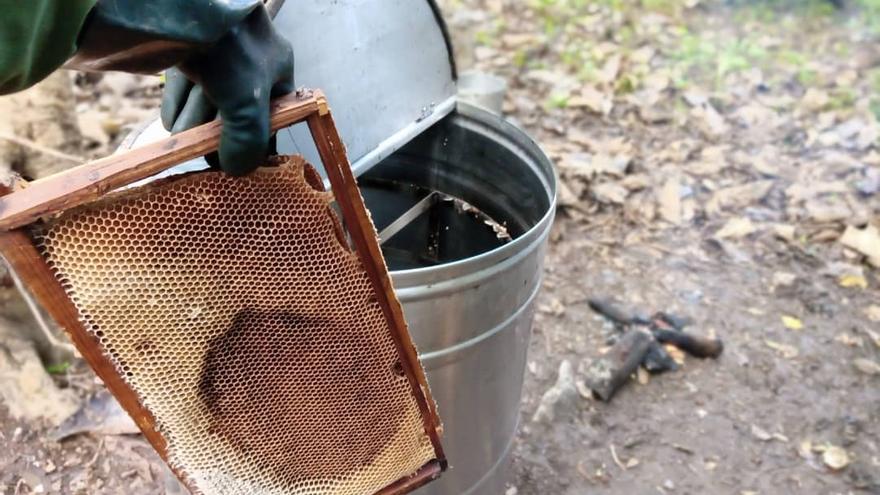
Purity, the first quality criterion for exports, cannot be compromised by pharmaceuticals. “It is not convenient for the State,” denounces Leonardo, “since this would affect the price of Cuban honey in the world market, which highly values everything that is processed without the use of chemical substances.”
The varroa mite sucks the hemolymph from the larvae as well as from adult bees. They drain their strength and make them repositories of a virus. Then the animal’s body begins to suffer, the wings atrophy and cannot work. “Then the workers come and end up expelling the sick bee,” explains Leonardo. “They think that the one who doesn’t work doesn’t eat, and she doesn’t have the right to live either.”
“When this disease enters the hive,” he says, “all you can do is watch them slowly die off. The state isn’t going to sell us the drugs to cure them. The last thing they want is for us to tamper with the state.” organic honey”.
________________________
Collaborate with our work:
The team of 14ymedio He is committed to doing serious journalism that reflects the reality of deep Cuba. Thank you for accompanying us on this long road. We invite you to continue supporting us, but this time becoming a member of our newspaper. Together we can continue transforming journalism in Cuba.
